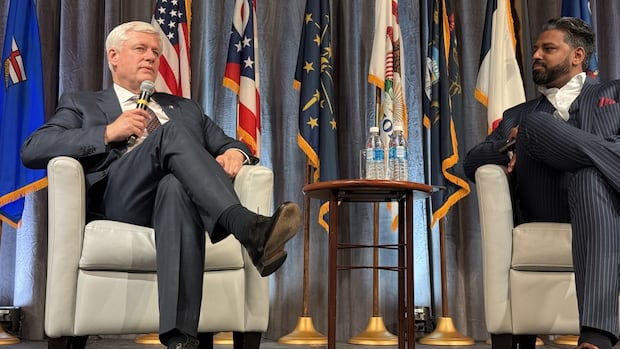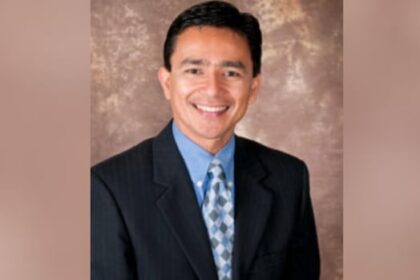SaskatoonLawmakers from four provinces and 11 midwestern states are in Saskatchewan from July 27 to July 30 for the Midwestern Legislative Conference, hoping to forge closer relationships as federal counterparts spar over trade.’This really is a wake-up call for this country’: former prime minister says Canada needs to diversify tradeKatie Swyers · CBC News · Posted: Jul 28, 2025 12:03 PM EDT | Last Updated: 4 hours agoThe United States’ current direction will weaken the free world more than it will help it, former prime minister Stephen Harper said at the 2025 Midwestern Legislative Conference in Saskatoon. (Jeremy Warren/ CBC)Speaking before a room full of policymakers from midwestern Canada and the United States, former prime minister Stephen Harper said the ongoing trade war with the U.S. is a “wake-up call” for Canada to diversify its trade and export markets. “I was — I think it’s fair to say — probably the most pro-American prime minister in Canadian history,” Harper said of his tenure from February 2006 to November 2015.If the current government asked him a year ago for advice on Donald Trump being reelected and wanting to renegotiate trade, he would have said: “This is a real opportunity for Canada to really deepen its economic and security partnership with the United States.” “However, when this government did actually ask me a few weeks ago … my advice was the opposite,” he told the Midwestern Legislative Conference, an annual, non-partisan event, which is being held in Saskatoon this year under the shadow of the ongoing U.S.-Canada trade war.Harper called the trade war unfortunate, but said “this really is a wake-up call for this country to truly diversify its trade, export markets.” Fromer Stephen Harper told attendees of the 2025 Midwestern Legislative Conference in Saskatoon that he advised the current government to spend more on defence. (Jeremy Warren)Canada has become “grossly” overly reliant on the U.S., “independent of the current disputes,” and “there is no reason for that,” he said. “Just because we have that geographical proximity does not justify the degree of dependence that we have on a single market.” Using tariff barriers is ‘failed economic policy’ The idea of tariff barriers to raise revenue and relocate industries is “a failed economic policy where it has been tried,” Harper said, adding U.S. lawmakers should “bring the facts to bear on Washington.” “Understand that Canada is your largest, most balanced and most lucrative trade arrangement in the entire world, by a lot,” said Harper. U.S. Ambassador to Canada Pete Hoekstra spoke after Harper and said the U.S. believes it needs a strong manufacturing sector and President Donald Trump’s agenda supports growing the U.S. economy. “We cannot sustain, as the leader of the free world, $37 trillion in debt and $2 trillion of annual deficits each year,” said Hoekstra. That’s why the president embarked on the issue of trade, bringing in tariffs, he said.On the current trade negotiations, for which Trump originally gave Canada an Aug. 1 deadline, Hoekstra said he believes once President Trump and Prime Minister Mark Carney have finished, “the framework will change, but the fundamental fabric that holds our countries together will continue to be there.”Premier Scott Moe said Canada needs to be “far below” the 15 per cent tariffs that the EU agreed to over the weekend, and says he’s waiting until after Aug. 1 to consider using goods from Saskatchewan, such as potash and uranium, as leverage during trade negotiations.The province of Saskatchewan has many cards to play, said Moe, but “Canada and the U.S. are actually on the same card-playing team.” The conference began on Sunday and runs to Wednesday. It brings together provincial and state legislators from Canada and the American Midwest. Saskatchewan, Alberta, Manitoba and Ontario are the Canadian provinces in attendance, and Illinois, Indiana, Iowa, Kansas, Michigan, Minnesota, Nebraska, North Dakota, Ohio, South Dakota and Wisconsin are the U.S. states.Saskatchewan Premier Scott Moe tells reporters at the 2025 Midwestern Legislative Conference in Saskatoon that it’s important to see the next Canada-US trade agreement before “looking at what we have in the quiver” and using goods like potash and uranium for leverage. (Travis Reddaway/CBC)Conference chair and Saskatchewan MLA Lori Carr said the goal is to find common ground on the regional level and learn from each other, adding that if policy-makers cook up a possible trade resolution, they’ll take it to their respective federal governments.”We really are talking more local here,” Carr said.She described it as an opportunity to share regional success stories, citing carbon capture in Estevan, Sask., about 205 kilometres southeast of Regina, as an example.”If they still have coal plants that are burning, then they might be able to take up this technology,” Carr said.”We have a lot of trade that goes back and forth across the United States border from Saskatchewan and the majority of our trade goes to these 11 U.S. states,” Carr said. “So they’re our customers, in essence.”Manitoba MLA Terry Duguid said it’s a special time in Canada-U.S. history.He said the conference will help emphasize what Canada and the U.S. have in common “rather than our differences.””It’s important to understand one another and the ties that unite us in trade and defence,” Duguid said.”Our relationship — despite headlines — is strong, is very connected and integrated.”Topics that might come up this week include the importance of the agriculture economy, energy, border security and water management, Duguid said, calling water especially important given the drought hitting much of the west.Illinois state Sen. Elgie Sims said the mood among delegates has been positive so far, despite the trade war looming over the conference.”I think we all understand we’re, at our core, we’re friends, we’re partners, we’re allies,” said Sims.Both Trump and Carney have signaled there might not be a new trade agreement by Friday.ABOUT THE AUTHORKatie Swyers is a reporter with CBC Saskatchewan, based in Regina. She is a 2021 Joan Donaldson Scholar and has previously worked for CBC Podcasts, CBC’s Marketplace, CBC’s network investigative unit, CBC Toronto, CBC Manitoba and as a chase producer for Canada Tonight on CBC News Network. You can reach her at katie.swyers@cbc.ca.Follow Katie Swyers on Twitter
Former prime minister Stephen Harper says he advised Mark Carney’s government to move away from the U.S.











